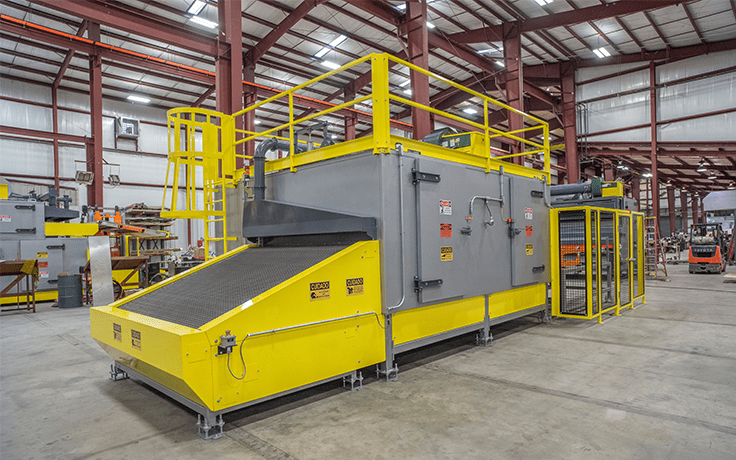Industrial Oven Maintenance
Cleaning Your Industrial Oven Like a Pro
Every piece of industrial equipment is subjected to various types of stresses and strains, but few take the heat like an industrial oven. Regular oven maintenance is crucial to maximizing oven life, reducing shutdown frequency, and maintaining the quality of thermally treated products.
When performing preventative maintenance, there’s no substitute for following your manufacturer’s maintenance regimens — literally by the book. Every model of industrial oven is different and should include an owner’s manual that lays out specific maintenance requirements, often in a checklist format.
Oven maintenance checklists are sometimes broken down by time frames, such as a shift checklist, a weekly checklist, a monthly checklist and a periodic checklist. Those should be followed exactly as the manufacturer outlines.
Despite differences in industrial oven models and industrial oven manufacturers, there are several common areas involved in all preventative oven maintenance.
These aspects of industrial ovens that require regular monitoring include:
Air Pressure Switches
Among the most common causes of oven failure, air pressure switches should be checked weekly for proper pressure settings. They should be replaced periodically, according to manufacturer recommendations.
Sensors and Connectors
If a sensor/thermocouple fails, the built-in safeties will shut down the system and prevent catastrophic failure. If a sensor is not working properly, damage to the products being processed in the oven can result due to inconsistencies in the temperature profile. A regular replacement program should be established for all control and safety thermocouples. The effective life of thermocouples varies depending on the environment and temperature, so these factors should be taken into account when setting up a replacement schedule.
Heating Elements in Electric Ovens
Bad heating elements can cause an oven to fail to achieve the desired temperature profile. Pull the heater to visually inspect the tubular elements. Remove any foreign contaminants. If the elements are dirty, clean them to prevent buildup. Check to see if any have become dislodged or distorted; if they touch alloy hearths or oven components, grounding or shorting can occur. Remove the back plate of the heater to check that all element terminals are tight. Loose connections can cause arcing and oxidation that can result in burnout of the terminal.
Auxiliary and Control Devices
Contactors should be checked and replaced periodically. Pitting due to arcing can result in welding of the contacts and uncontrolled application of power to the oven. All control components, including pyrometers and relays, should be checked periodically to ensure proper operation or control accuracy. Instructions provided by the manufacturer of each control component should be followed with care.
Electric Power Supply
The voltage supplied to electric ovens should be maintained within reasonable limits to guard against overloading of control devices and transformers. Under-voltage can result in operational failure of relays and solenoid valves. Ensure a consistent supply of power to the oven, installing transformers if necessary.
Airflow
Although airflow problems aren’t common, restricted airflow will definitely have an effect on oven performance and will change the temperature profile. In extreme cases involving electric heat, it can lead to overheating and failure of electric elements. Ensure that all fans are wired to rotate in the correct direction. Check that the oven chamber, ventilation and ductwork are devoid of any buildup of dirt or contaminants.
Heat Loss
Regularly check doors, gaskets and port inserts for integrity of heat seals.
In addition to these maintenance mainstays, there are a number of other parts in most ovens that are key to proper operation, including fan belts, fuses and breakers. These also require periodic replacement.
Certain maintenance tasks should be left to qualified professionals, such as inspecting, cleaning and adjusting gas burners and combustion systems. Your equipment manual should delineate which maintenance tasks are owner-operator functions, and which need professional assistance. In the event that you do need qualified help, Davron Technologies has certified technicians who can handle any oven maintenance challenge.
